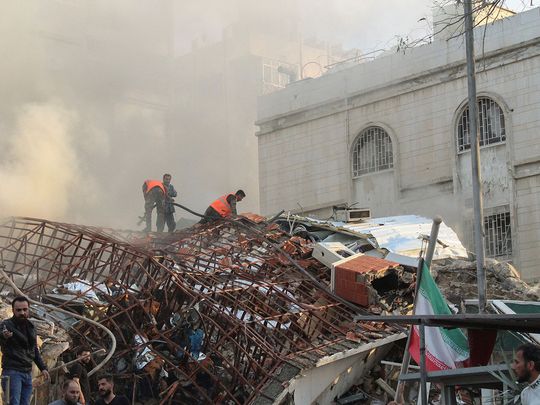
We watched in shock earlier this week as our region seemed as if it were teetering ever so close to the brink of an all-out, multi-front war.
Israel bombs an Iranian diplomatic compound in Damascus, killing five members of Iran’s Revolutionary Guard Corp, a significant escalation in a region already roiled by the war in Gaza. Iran retaliates by firing missiles and drones on Israel, virtually all shot down with help from the US and other allies. On Monday, Israel’s military chief, Herzi Halevi, tells the world that Israel will most assuredly retaliate against the retaliation, leaving the time and scope of the act to the war cabinet to determine.
The following day, Iran’s president, Ibrahim Raisi, tells the same world that Israel’s threatened counter-retaliation will be met by, well, a counter-counter-retaliation. “We categorically declare that the smallest action against Iranian interests will most certainly be met with a severe, widespread and painful response against any perpetrator”.
Both sides, it would appear, are ready to rumble. All that is needed now is for that one miscalculation, that one wrong decision, that one provocative act by either side to ignite a catastrophic outbreak of war, threatening regional stability.
“Blood-dimmed tide”
These are dangerous times that cannot but remind us of Barbara Tuchman’s Pulitzer Prize-winning, highly-acclaimed and influential book, The Guns of August (1962), thematically centred on the first month of the First World War and the errors of judgement, the perils of ignorance, the flawed decision-making, the unrestrained hubris and, yes, lest we forget, the fragile egos of European leaders — leaders infected at the time with the fever of European nationalism — that led to the greatest conflagration in human history, the end of the belle époque and the advent of what W.B. Yeats went on to call the “blood-dimmed tide”. All in all, a time that traumatised Europe and to a lesser extent the rest of the globe.
This is what today ordinary folks in the Middle East, who just want to go about the business of living their lives in peace, fear might befall them — Yeats’s blood-dimmed tide, a time when “Things fall apart, the centre cannot hold/ where anarchy is loosed upon the world/ the blood-dimmed tide is loosed, and everywhere/ the ceremony of innocence is drowned”.
If you want to see an image, in real time, of that apocalypse — if you seek a context to the philosophical roots of the inhuman, to an infinity of waste whose brutal realities are yet be drawn and put into words — then turn on your TV to see it streaming on your screen from Gaza, and consider for yourself how war is, in and by itself, as Ernest Hemingway put it, no less than a “crime”.
Hemingway, who was 18 when he volunteered to be an ambulance driver in the First World War, where he saw first-hand the stupefying horrors of trench warfare, of men lunging and tearing at each other’s throats, much in the manner of beasts, emerged from his experiences convinced that war was indeed a crime against humanity, albeit one perpetrated by humans against themselves.
“Never think that war”, he wrote, “no matter how necessary, no matter how justified, is not a crime”.
Our tragedy is that somewhere in our evolutionary continuum we came to embrace the belief that man-made collective death, which is what war is, has been throughout human history such an omnipresent part of our human condition that we should accept its recurrence as a given, a constant in our lives.
It doesn’t have to be like that. It shouldn’t be like that.
Call for restraint
And many of us, pacifists one and all, believe that truth, as do those hundreds of thousands of anti-war demonstrators around the world, who marched in the streets of their cities all over the world to protest against the war in Gaza on Monday, including those who held large-scale protests across the US that same day, closing down highways, roads and bridges — all the way from the Golden Gate Bridge in San Francisco to the Brooklyn Bridge in New York — in a coordinated call on the White House to pressure Israel to end its relentless military campaign in Gaza.
And I can tell you, as an anti-war activist who cut his teeth as one such back in the hyperactive 1960s, that anti-war protests do indeed make a difference,
Does anyone, other than sabre-rattling hawks, who typically ignore where escalation often leads and what its consequences might be, want a war to erupt on top of another war already ravaging our part of the world? One’s guess is, well, no one.
Thus, when leaders in the Arab world call for restraint, as they have done since the Iran-Israel imbroglio began, I like to read that as a resounding call against war in our region. The call echoes our own sentiments.
— Fawaz Turki is a noted academic, journalist and author based in Washington DC. He is the author of The Disinherited: Journal of a Palestinian Exile







_resources1_16a45059ca3_small.jpg)

